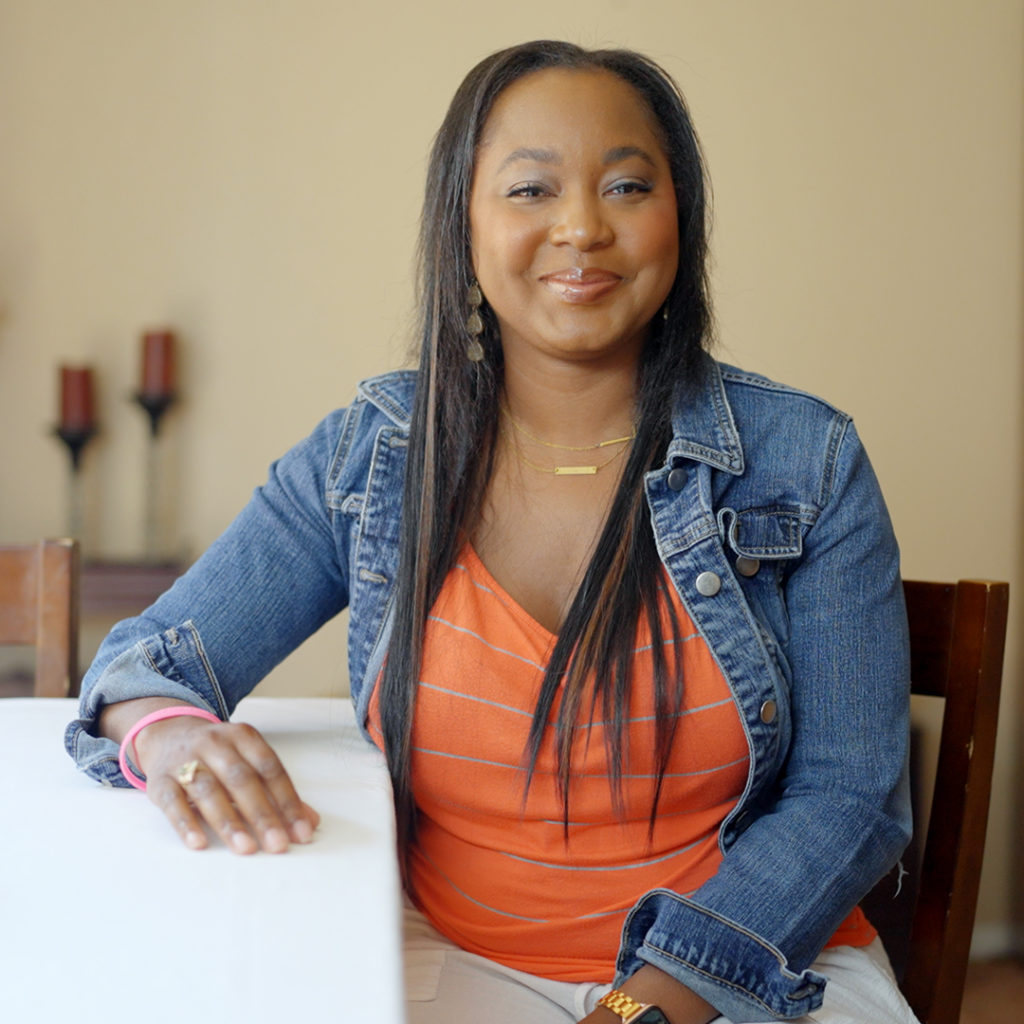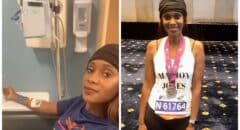
Neuromyelitis optica spectrum disorder or “NMOSD,” is a rare, lifelong and debilitating autoimmune disease that is most common among non-Caucasian women in their 30s and 40s.1 The disease is often misdiagnosed and misunderstood – which may lead to damaging delays in treatment.
Tamanika Zinger knows first-hand how difficult it is to be properly diagnosed and treated with the rare disease. Her journey started when she had a strange and disturbing experience on her first date with the man who became her husband. “All of a sudden the world was spinning, there was pain in my eye, and I was unstable on my feet,” she says. “I was seeing double of him, though, and it was fabulous.”
While she jokes about seeing her future husband that way, Tamanika describes the experience as a “very tough time.” She went to Urgent Care, where a doctor told her she had vertigo, and it would go away. “So, I did nothing,” she says. “I left it at that.” But Tamanika’s symptoms persisted, and worsened when she lost hearing in her left ear. Urged by family members in the medical profession, she went to see a neurologist to get to the bottom of her symptoms. He diagnosed her with multiple sclerosis (MS), and treated her accordingly. Despite the treatment, her symptoms continued to worsen. She switched neurologists, but had a similar experience. “Now we’re three years into the disease, and I went blind in my right eye, right around the time my oldest son was 2-years-old,” she says.
Her brother urged her to get a third opinion, and went with her to the doctor because he felt that her symptoms didn’t line up with the MS diagnosis. “This was my third neurologist in seven years,” she says. “But I wasn’t going to quit advocating for myself until I found someone who listened to me and gave me a diagnosis that made sense.”
Right away, the new doctor said, “This is not MS. This is NMOSD.” Tamanika had never heard of the disease. “Sounds like alphabet soup,” she says. The doctor explained that NMOSD attacks the central nervous system, causing inflammation in the optic nerve and spinal cord. The attacks can lead to accumulating, permanent neurological damage, visual impairment and disability, and the damage accumulates as the symptoms build with each relapse. It’s a difficult diagnosis.
“NMOSD is frequently not considered and misdiagnosed,” says Dr. Kalina Sanders, a board-certified neurologist who practices at Baptist Health in Jacksonville, FL. One reason, she says, is that the symptoms are similar to MS, and many physicians fail to recognize the hallmarks of the rare disease – attacks called optic neuritis that result in loss of vision in one or both eyes, severe muscle weakness including paralysis, or a failure to respond to MS treatments. Furthermore, while there is limited understanding as to why this is the case, a recent study found the incidence and prevalence of NMOSD was substantially higher among Black people living with the condition compared to Caucasians.2 “It’s well-known that Black men and women are often medically underserved, and may not have the resources for second or third opinions,” says Dr. Sanders. “This makes it critical for early and accurate diagnosis, especially in rare diseases like NMOSD.” The fact that NMOSD damage accumulates makes early treatment essential, she says, to prevent permanent damage and disability.
“The damage that can be caused by delay in accurate diagnosis of NMOSD underscores why it’s so important for you to advocate for better care and treatment, until you get to the bottom of your diagnosis,” says Tamanika. Finally, at 31, married with two children, Tamanika found a doctor who could not only treat her appropriately, but listened to her questions and asked how he could help make her life less stressful. “My family always had a feeling the MS diagnosis wasn’t right,” says Tamanika. “They helped me realize how important it was to advocate for myself and my care. Now I have an amazing doctor who’s really on my side.” She says her doctor spends time with her at every appointment to make sure she understands what’s happening with her body and her treatment.
Tamanika says it’s crucial for women who have an incorrect diagnosis or suspect they have NMOSD to advocate for themselves in many ways. “You need to learn to speak up, ask questions, and do research, because information is power,” she says. “You know your body, so keep track of it every day, and document what’s happening.” She also recommends seeking out others who can help, including online support groups, advocacy groups, family, and friends. “You need a good system to help you, not just your neurologist,” she says. “It takes a village to help somebody with NMOSD.”
There are good days and bad days living with NMOSD, says Tamanika. “It impacts everything in my life.” Some days she tries to take a step, and her leg collapses. Simple things like brushing her hair and teeth are exhausting. “You have to make adjustments so you can live a life where you can enjoy as much as you can,” she says. Instead of shopping, she has groceries delivered. She has canes and walkers to support her in the house. She relies on her children and husband for support. “Staying positive and navigating through the tough days with this rare disease can be difficult, but there’s a lot of things you can do,” she says. “I can’t do anything about the past, but I can enjoy my family and friends.”
Tamanika also works with the Sumaira Foundation — a NMOSD advocacy organization — as an ambassador. “I always loved working, and this was work I could do to make a difference, bringing awareness to people about the disease,” she says. She began posting to social media and fundraising, focusing on empowering others living with or affected by the condition to advocate for the care they need. “I like this work because it’s bright and shiny, not drab and depressing. We’re bringing light to the disease.”
More information about NMOSD and the importance of proper diagnosis and early treatment is available at Gene.com.
1. Guthy Jackson Foundation. NMO FAQs. https://guthyjacksonfoundation.org/nmo-faqs
2. Clisson, Christopher C. “Neuromyelitis Optica Spectrum Disorders.” UpToDate, 2019.









